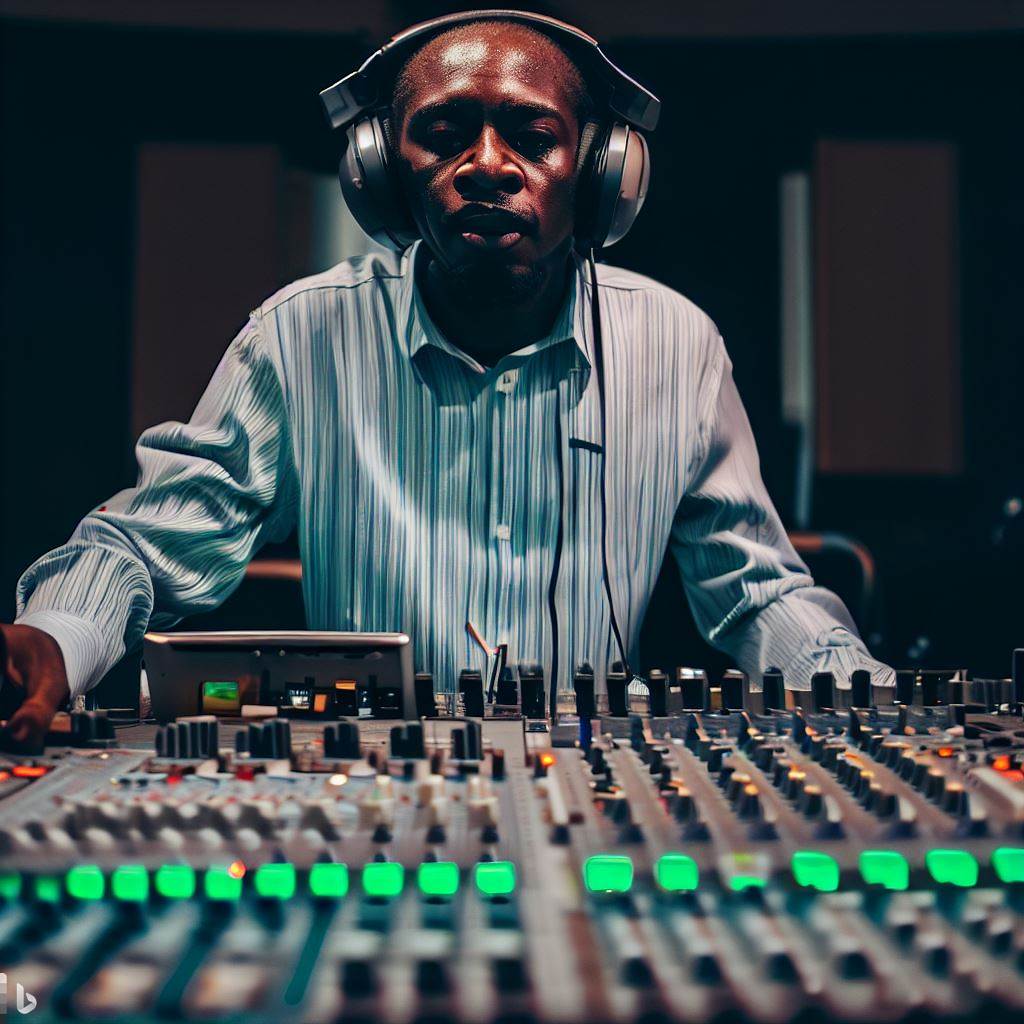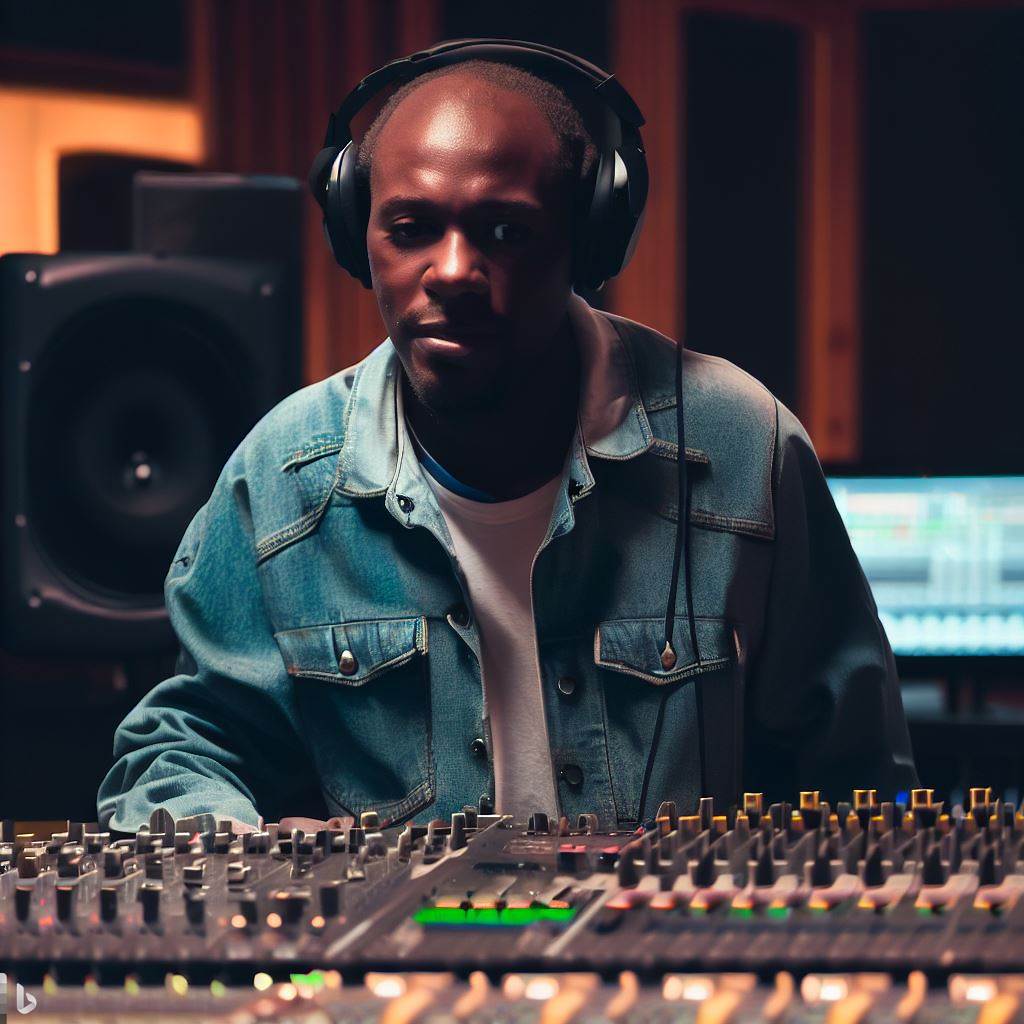Introduction
A mixing engineer is a professional responsible for blending and enhancing audio tracks to perfection. In this blog post we would be looking at the Mixing Engineer Challenges and Triumphs.
In Nigeria, the music industry is thriving, with a diverse range of genres and talented artists.
The importance of a mixing engineer in Nigeria cannot be overstated as they play a crucial role in the success of a song.
Definition:
A mixing engineer blends audio elements—vocals, instruments, effects—creating balanced, impactful soundscapes for music production.
Overview:
Nigeria’s music industry, vibrant and diverse, resonates globally with Afrobeats, hip-hop, gospel, and more.
Importance of Mixing Engineers
- Sonic Craftsmanship: Engineers finesse sound quality, enhancing songs’ emotional impact and audience connection.
- Genre Versatility: Adapting skills to various genres ensures distinct audio signatures for different music styles.
- Creative Enhancement: Engineers collaborate to transform raw tracks into polished, professional pieces.
- Technical Prowess: Proficiency in software, acoustics, and equipment ensures pristine sound delivery.
- Industry Backbone: Engineers influence a song’s final form, supporting artists’ vision and market competitiveness.
Triumphs and Challenges:
- Triumphs: Crafting hits that move audiences, witnessing artistic growth, and contributing to Nigeria’s music acclaim.
- Challenges: Balancing artistic integrity with commercial demands, technical hurdles, and intense competition.
Mixing engineers shape the very essence of Nigerian music, their work echoing triumphs amidst challenges.
Challenges Faced by Mixing Engineers in Nigeria
Limited access to professional recording studios and equipment
- The first challenge that mixing engineers in Nigeria often face is the limited access to professional recording studios.
- Due to the high cost involved in setting up and maintaining such studios, there are only a few available options for engineers to work in.
- This scarcity makes it difficult for aspiring mixing engineers to gain practical experience and improve their skills.
Lack of standardized training and education opportunities
- Another major challenge for mixing engineers in Nigeria is the lack of standardized training and education opportunities.
- Although there are some institutions that offer audio engineering courses, the quality and availability of these programs are inconsistent.
- This lack of standardized training often hampers the growth and development of mixing engineers in the country.
Difficulty in working with limited budgets and resources
- Mixing engineers in Nigeria often face the challenge of working with limited budgets and resources.
- Many clients have limited financial resources, which means they cannot invest in top-of-the-line equipment or hire additional personnel.
- This limitation can often hinder the ability of mixing engineers to deliver high-quality results and fully realize their creative vision.
Inadequate recognition and support for mixing engineers
- Finally, one of the biggest challenges for mixing engineers in Nigeria is the inadequate recognition and support they receive.
- The music industry in Nigeria tends to prioritize the role of the artist or producer, often overlooking the contributions of mixing engineers.
- This lack of recognition not only undermines the efforts and achievements of mixing engineers but also discourages potential talent from pursuing a career in this field.
Mixing engineers in Nigeria face several challenges in their profession.
Limited access to professional recording studios and equipment, a lack of standardized training and education opportunities, difficulty in working with limited budgets and resources, and inadequate recognition and support all pose obstacles to their success.
However, despite these challenges, many mixing engineers in Nigeria continue to persevere and make significant contributions to the music industry.
It is crucial for the industry and stakeholders to address these challenges and provide the necessary support and recognition to enable the growth and development of mixing engineers in the country.
Read: Salary Expectations: What Does a Mixing Engineer Earn in Nigeria?
Triumphs experienced by Mixing Engineers in Nigeria
Creative problem-solving despite limited resources
Mixing engineers in Nigeria face numerous challenges due to limited resources, but they have developed remarkable problem-solving skills.
Despite not having access to state-of-the-art equipment, they find innovative ways to produce high-quality music.
For instance, when faced with a lack of high-end studio monitors, engineers have learned to rely on their experience and intuition.
They use alternative equipment or make the best use of what they have, ensuring that the mix translates well across different sound systems.
Moreover, they have become masters of crafting professional mixes in unconventional spaces.
Many studios in Nigeria lack proper acoustic treatment, but the engineers have learned to manipulate the room’s sound characteristics to their advantage.
They utilize strategic microphone and speaker placements, and sometimes even makeshift soundproofing techniques, to minimize unwanted reflections and create a balanced mix.
Embracing the unique Nigerian music style
One of the triumphs of Nigerian mixing engineers is their ability to embrace and showcase the unique music style of Nigeria.
Nigerian music is known for its infectious rhythms, vibrant melodies, and diverse genres like Afrobeat, Highlife, and Afropop.
Mixing engineers in Nigeria understand the intricacies and nuances of these genres. They have developed specialized skills in accentuating the essence of Nigerian music through their mixing techniques.
They pay attention to details such as accentuating the rhythmic syncopation, preserving the energy and spontaneity of live performances, and highlighting the cultural elements in the music.
Their expertise enables them to create mixes that truly capture the essence and soul of Nigerian music, making it resonate with both local and international audiences.
Gaining international recognition through successes
Triumphs of Nigerian mixing engineers also extend to gaining international recognition for their work.
Despite operating in a highly competitive industry, some engineers have managed to break through and work with renowned international artists.
Their successes can be attributed to their dedication, skill, and ability to adapt to different musical styles and preferences.
Through collaborations and networking, Nigerian mixing engineers have been able to showcase their talents on a global scale.
International recognition not only boosts their professional portfolios but also opens doors to new opportunities, such as working on international productions and gaining exposure to a broader audience.
Collaborations with top Nigerian artists and producers
Another triumph experienced by Nigerian mixing engineers is the opportunity to work with top Nigerian artists and producers.
Nigeria has a thriving music industry that has produced global stars such as Davido, Wizkid, and Burna Boy.
Mixing engineers in Nigeria play a crucial role in shaping the sound of these artists’ music. They collaborate closely with artists, producers, and songwriters to bring their vision to life.
Their contributions in terms of sound design, sonic clarity, and overall mix quality elevate the artists’ work and contribute to the success of their songs.
Working with top Nigerian artists not only enhances the reputation of mixing engineers but also allows them to showcase their skills to a wider audience within the country.
Despite the challenges faced in Nigeria’s music industry, mixing engineers have triumphed in various ways.
They have honed their problem-solving abilities, embraced the unique Nigerian music style, gained international recognition, and collaborated with top artists.
These triumphs highlight the resilience, talent, and endless possibilities within the Nigerian music production landscape.
Read: Networking for Success in Nigeria’s Voice Acting Industry

Tips for aspiring Mixing Engineers in Nigeria
Invest in personal recording equipment and software
One of the most important things for aspiring mixing engineers in Nigeria is to have their own recording equipment and software. This allows them to practice and work on their skills at their own convenience.
Seek mentorship and learn from experienced professionals
Aspiring mixing engineers should seek mentorship from experienced professionals in Nigeria. Learning from those who have already achieved success in the field can provide invaluable guidance and insight.
Stay updated with industry trends and techniques
To stay relevant and competitive, aspiring mixing engineers in Nigeria should stay updated with the latest industry trends and techniques. This includes attending workshops, conferences, and staying active on online forums and communities.
Network and collaborate with fellow musicians and producers
Networking and collaboration are key for aspiring mixing engineers in Nigeria. Building relationships with fellow musicians and producers can lead to opportunities for growth and exposure in the industry.
By following these tips, aspiring mixing engineers in Nigeria can increase their chances of overcoming challenges and achieving triumphs in their careers.
Investing in personal recording equipment and software allows for practice and development of skills on their own terms.
Seeking mentorship and learning from experienced professionals provides valuable guidance and insight. Staying updated with industry trends and techniques ensures relevance and competitiveness.
Finally, networking and collaboration with fellow musicians and producers opens doors to opportunities for growth and exposure.
To become a successful mixing engineer in Nigeria, it is important to be proactive and dedicated. The challenges may be many, but with the right mindset and strategies, triumphs can be achieved.
So, start investing in personal recording equipment and software, seek mentorship, stay updated with industry trends, and network and collaborate with fellow musicians and producers.
With these tips in mind, aspiring mixing engineers in Nigeria can pave their way to a successful career in the music industry.
Discover More: Success Stories of Prominent Nigerian Music Publishers
Conclusion
Mixing engineers in Nigeria face numerous challenges, including limited access to quality equipment, lack of proper training opportunities, and low industry recognition.
However, despite these obstacles, they have managed to triumph through their resilience, creativity, and dedication to their craft.
Recognizing and supporting the role of mixing engineers is crucial for the growth and development of the Nigerian music industry.
These professionals play a vital role in shaping the sound and quality of music, and their expertise should be acknowledged and appreciated.
By investing in their training, providing them with better resources, and giving them due credit, the industry can thrive and produce high-quality music.
To aspiring mixing engineers in Nigeria, it is essential to hold onto their passion and remain determined despite the challenges they may face.
By seeking out educational opportunities, networking with industry professionals, and continuously improving their skills, they can overcome obstacles and achieve success in their field.
With dedication and perseverance, they can make their mark on the Nigerian music industry and contribute to its growth and innovation.




